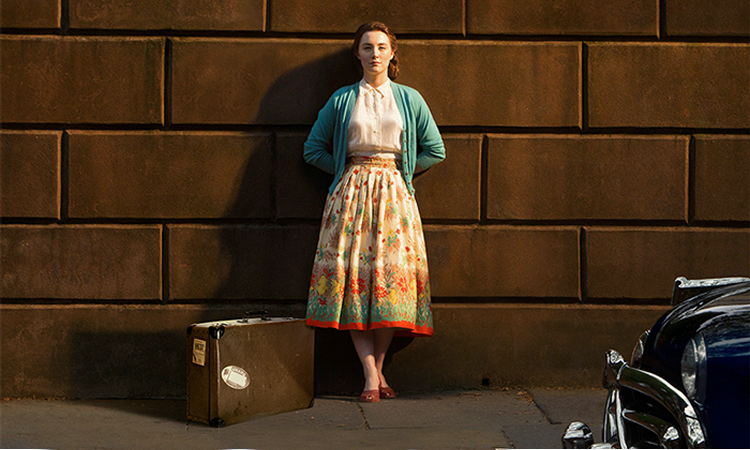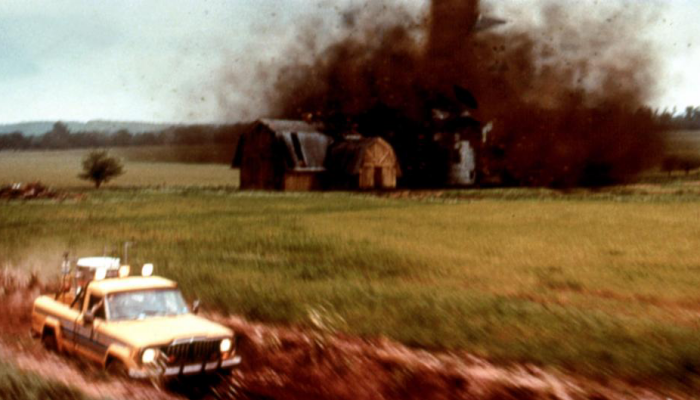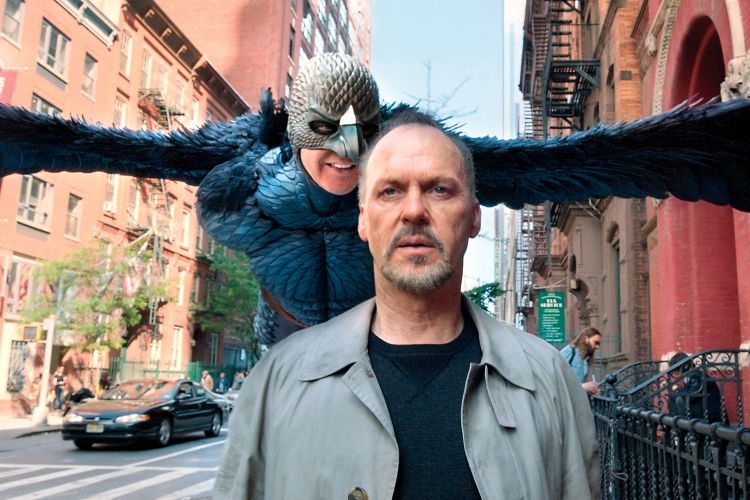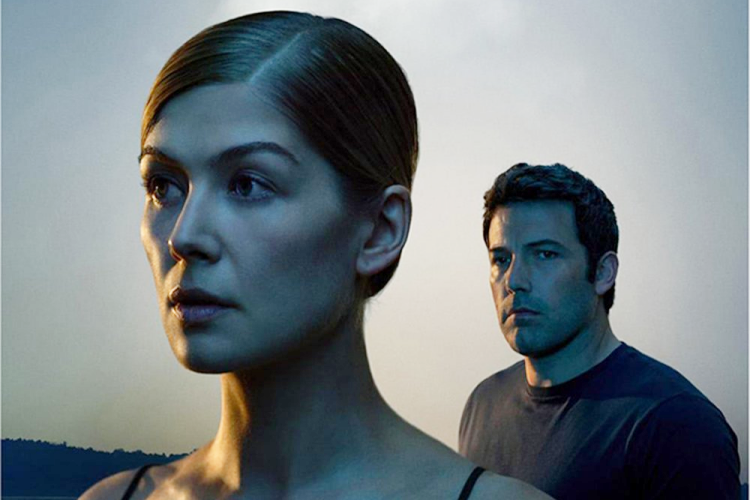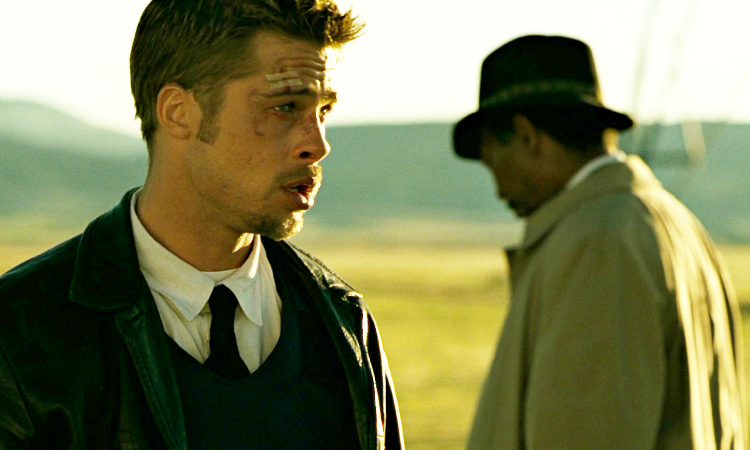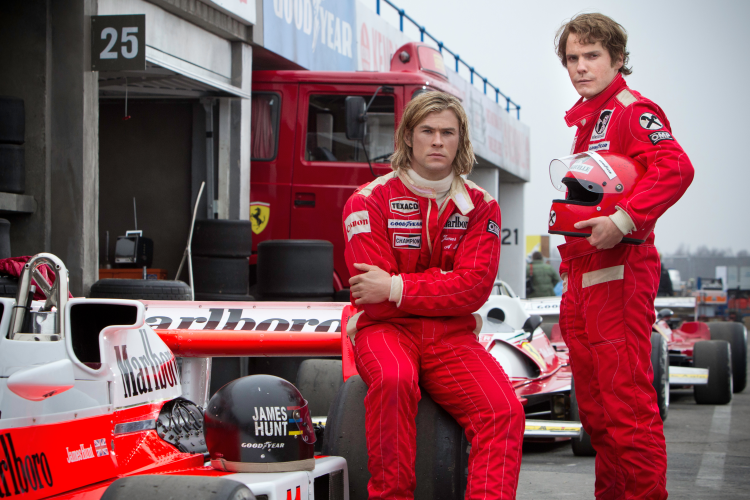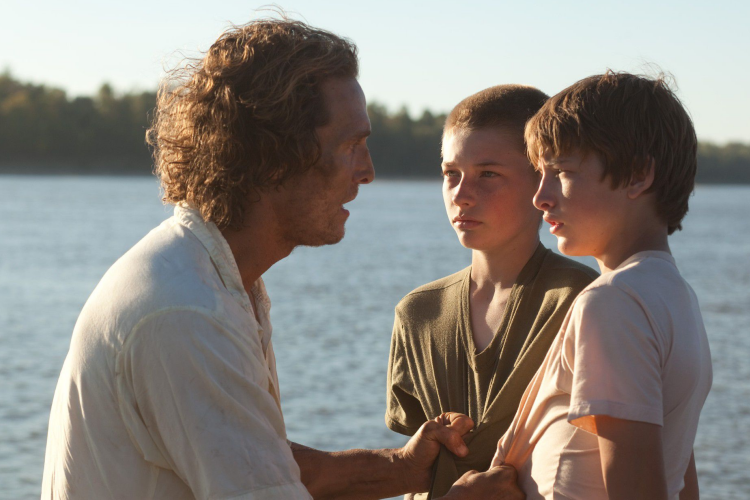 |
| Photo Credit: Interstellar / Paramount Pictures |
On a futuristic Earth, our planet is slowly dying. Humankind is staving off extinction from starvation and suffocation; the crops have failed and dust bowls sweep through the last remains of working farms. A brilliant scientist Dr. Brand (Michael Caine) and his daughter Amelia (Anne Hathaway) are convinced their last chance of survival is to explore of a wormhole discovered near Saturn's galaxy and its possible habitable planets.
Former Air Force pilot and engineer Cooper (Matthew McConaughey) is recruited by a secretly-funded NASA to pilot one last mission. Sacrificing himself to secure Earth's future has one deeply personal drawback. His children's generation will be the last to survive and chances are Cooper may never return; his choice gashes the relationship with his young daughter Murphy (Mackenzie Foy).
Director Christopher Nolan's work spurs you to watch his cerebral plots unfold over and over again.
Memento teases its backward storytelling.
Inception plunges into reality versus dreams, and dreams within dreams. The complexity of
Interstellar's zeal is to
depict Eistein's theory of relative time and space as well as the enormous conflicts of man's capabilities for exploration and love. Nolan's ambitious worlds can sometimes work against itself since his complex stories can polarize movie goers. With
Interstellar, his imagination invigorates us but can also work against itself.
Under the hubbub and central plot of astrophysics, multiple dimensions, and wormholes,
Interstellar works its magic by splitting the story of theories on chalkboards versus what we feel intuitively. It challenges the balance to accepting both sides of the equation. Applications can be reworked around a finite amount of equations and outcomes but humanity is more complex.
Cooper doesn't necessarily belong on Earth but he will go above and beyond what is necessary to save his family and millions of others. He embodies not only the pioneer in each of us who wants to travel the stars but also the bygone American era of discovery. His children are growing up in an entirely different era than one of his own. College is a pipe dream, and though his children are intelligent, their best chances of a future is to be a farmer just like him. Cooper's journey is about his long-gone dreams of exploration being fulfilled as much as it is about the ones who are left behind during his voyage.
Portrayed by Matthew McConnaughey, and his daughter by Mackenzie Foy, their relationship creates the greatest emotional momentum. McConaughey recently revived his career over the past few years and earned an Oscar for
Dallas Buyers Club; his career continues to soar in a leading performance that is sincere and heartbreaking, even for a complex blockbuster that puts our minds to work. Cooper's daughters played by Mackenzie Foy and Jessica Chastain is equally moving as the daddy's girl who is left behind - in what they believe - to die and coming to terms with their father's absence.
In an equal parallel relationship, Amelia Brand leaves her elderly father behind in order to carry out NASA's mission. Played splendidly by another recent Oscar winner Anne Hathaway, her relationship to Cooper acts almost as the one Cooper would've had with his daughter. Both Cooper and Brand's emotional vulnerabilities cloud the theories and options in securing mankind's futures.
Love which is intrinsically quantifiable is tested against the perimeters of their voyage. As theories and data are swallowed up and dissected for best possible outcomes, not only does the universe spar against their mission but other characters too. One actor in particular (I won't spoil here) was especially surprising and creates a heart-pounding antagonist to Cooper and Co's nearly impossible quest. Obstacles - simply put, invade all dimensions.
What proves to be a bit of an obstacle in the film's production is the complexity of the script and their mission. Both
Christopher, and his brother Johnathan Nolan studied under physics expert Kip Thorne to needle out the details of what a wormhole would be like on film and how to depict accurately with special effects. Visually what's created is nothing short of adventurous, beautiful awe. However, the laws of space, time, and physics can be confusing to follow - most specifically in the third act.
In comparison to Nolan's other films like
Inception or
The Prestige there is enough provided via dialogue for example that you can pinpoint where the story is going and how it ends up with a mind-bending conclusion.
Interstellar requires more suspension of disbelief. If you are not familiar with astrophysics, the story and narrative can hit some bumpy roads. It can be hard to keep track of the technology, time lapses, space lapses, planet locations, wormholes versus black holes, and overall worldbuilding.
The ability to turn off your brain though and watch the tangled complex trek the characters take is also a big part of the ride to enjoy; the complicated scientific nature of the film is what
wondrously sweeps you off your feet and blasts you out of your life and into another cinematic sphere. Even if the science isn't fully comprehensible on its first viewing,
Interstellar leaves you wanting more. As the director always manages to do, I was left feeling a little obsessed with my confusion, in love with his ideas, and hypnotized by the film's beautiful ambition.
Hypnotized might be the best word to describe what quickly became one of my favorite movies of the year. Composer, Hans Zimmer described the process of his tantalizing score as
one that was as personal to Nolan's process as the director. Throughout the movie, similar to Alfonso Cuaron's
Gravity, the sound of silence and orchestra deepens the mood of nostalgia and the rapturous quest.
Unlike Nolan's previous work, it's hard to categorize his very personal film
under one umbrella; a fallen previously high-tech society drama dealing with family dynamics and survival. Drawing intense inspiration from
2001: A Space Odyssey, it serves as a reminder of what good science fiction in film can be. Coop's relationship to his daughter is a soul-touching love story between father and daughter. Humankind's plunge to save each other, our passion, dedication to self-preservation, and devotion to loved ones throughout dimension serves as inspiration for how far mankind has gone and can go.
Nolan's films don't require people to not necessarily read between every single line but also slowly builds a mosaic of layers that by film's end it's wondrous how it all came together - even if it needs another viewing to piece it all together. Similar to
Gravity, I walked out of the movie theatre grateful for my feet sticking to Earth's surface. Exiting out of
Interstellar, I looked at the stars and was grateful for mankind's ambition to be one with them. I couldn't help but wonder
what's next? It's all relative.
Rating: ★★☆
Have you seen Interstellar? What did you think?
